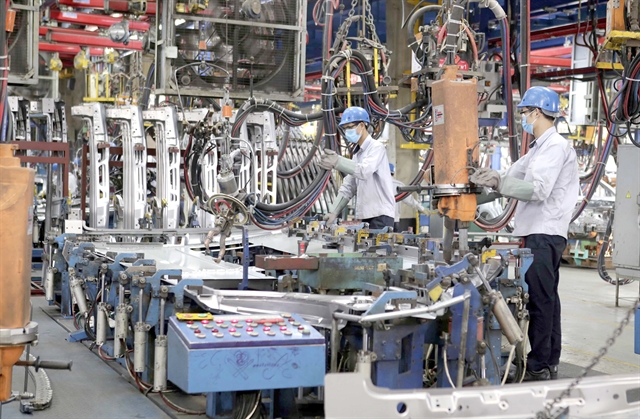However, the complicated developments of the COVID-19 pandemic from the end of April, which directly affected a number of industrial zones in the two provinces of Bac Giang and Bac Ninh still made many enterprises worried.

Implementing effective COVID-19 prevention measures at industrial parks and export processing zones should be a top priority for the country from now until year-end to ensure stable industrial production growth, according to the Ministry of Industry and Trade (MoIT).
The management boards of industrial parks and export processing zones should require enterprises operating in these zones to self-review and then revise measures to both prevent and control the spread of COVID-19 and ensure their production activities, the MoIT said.
The ministry also requested localities to strictly handle violations made by civil servants in COVID-19 prevention and control that might negatively affect local production and business activities.
The index of industrial production (IIP) grew by 9.9 per cent in the first five months of this year over the same period last year.
By sector, the processing and manufacturing industry increased by 12.6 per cent; the electricity production and distribution industry increased by 8.3 per cent; water supply, drainage and waste treatment 7.5 per cent; while the mining industry fell by 7 per cent.
Among the secondary industries, a number of key industries had a high production index in the first five months compared to the same period last year.
Metal production grew by 38 per cent; motor vehicle production 35 per cent; production of beds, wardrobes, tables and chairs 18.3 per cent; and production of electronic products, computers and optical products 15.5 per cent.
The positive IIP in the period was attributable to effective COVID-19 prevention measures and the State’s accurate and timely policies to support businesses, stimulate the domestic market and boost exports, the ministry said.
However, the complicated development of the COVID-19 pandemic from the end of April, which directly affected a number of industrial zones in the two provinces of Bac Giang and Bac Ninh still caused concerns for many enterprises.
Chairman of the Ha Noi-based TOMECO An Khang JSC Le Quy Kha told Ha Noi Moi (New Ha Noi) newspaper that the increasing prices of steel and the fourth COVID-19 wave would impact business and production activities.
Thus, besides tax payment extension, businesses also hoped to soon access the source of vaccines so that all of their workers could be vaccinated, Kha said.
Spain-based FocusEconomics, which provides in-depth economic analysis globally, said in its May report that after last year's slowdown, industrial production is projected to gain momentum on the back of returning demand from key international partners.
"Despite the ongoing COVID-19 pandemic, the underlying strength of Viet Nam's industrial sector remains intact: Viet Nam is an attractive low-cost base for manufacturing firms, including those looking to relocate from China due to US-China trade tensions," it said.
"That said, a sluggish rollout of the vaccine, coupled with an uncertain development of the pandemic, pose a risk to the positive outlook."
FocusEconomics also estimates that Viet Nam's industrial output will grow 9.2 per cent in 2021, down 0.2 percentage points from last month's forecast.
For 2022, FocusEconomics expects the country's industrial production to expand by 8.4 per cent. — VNS





